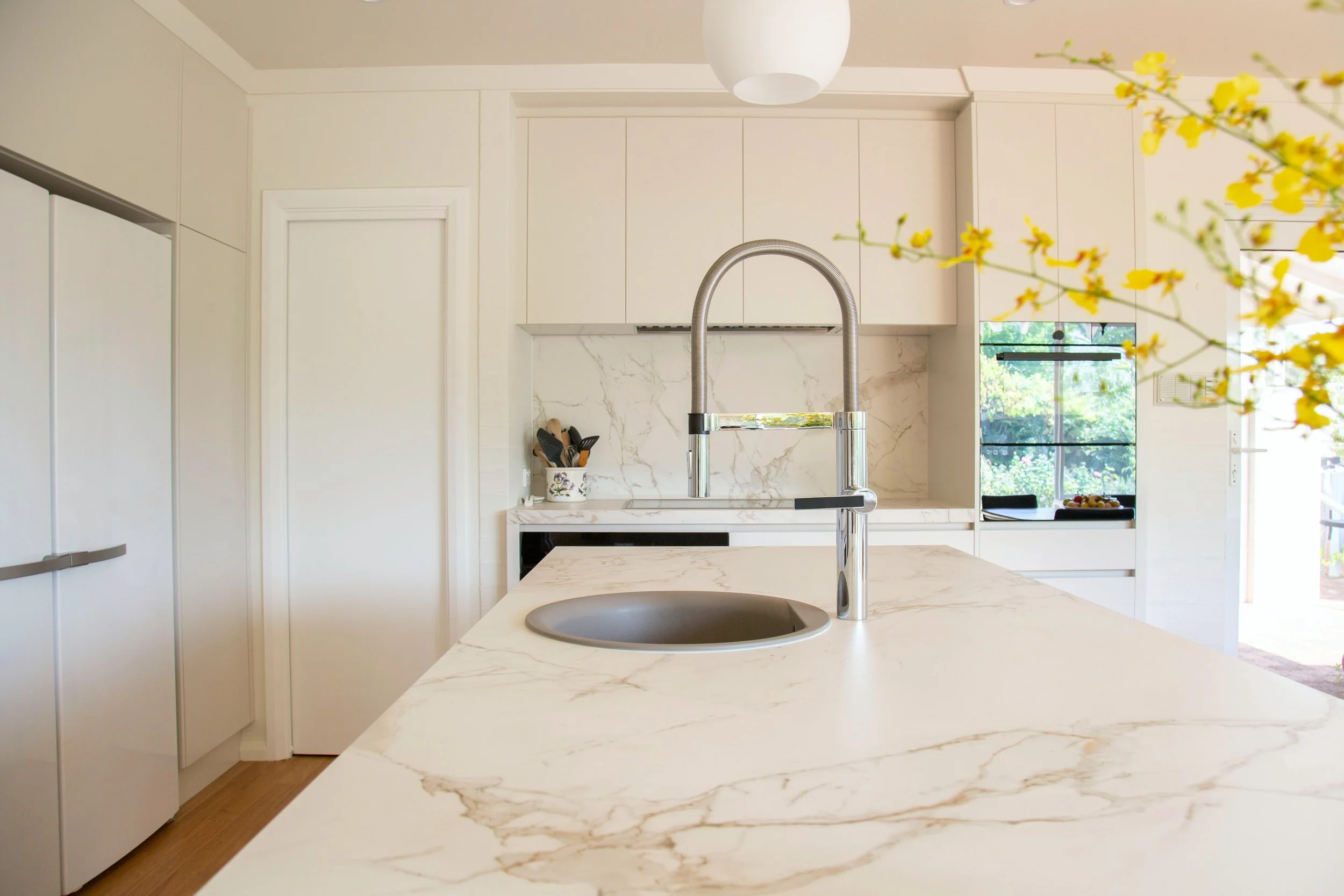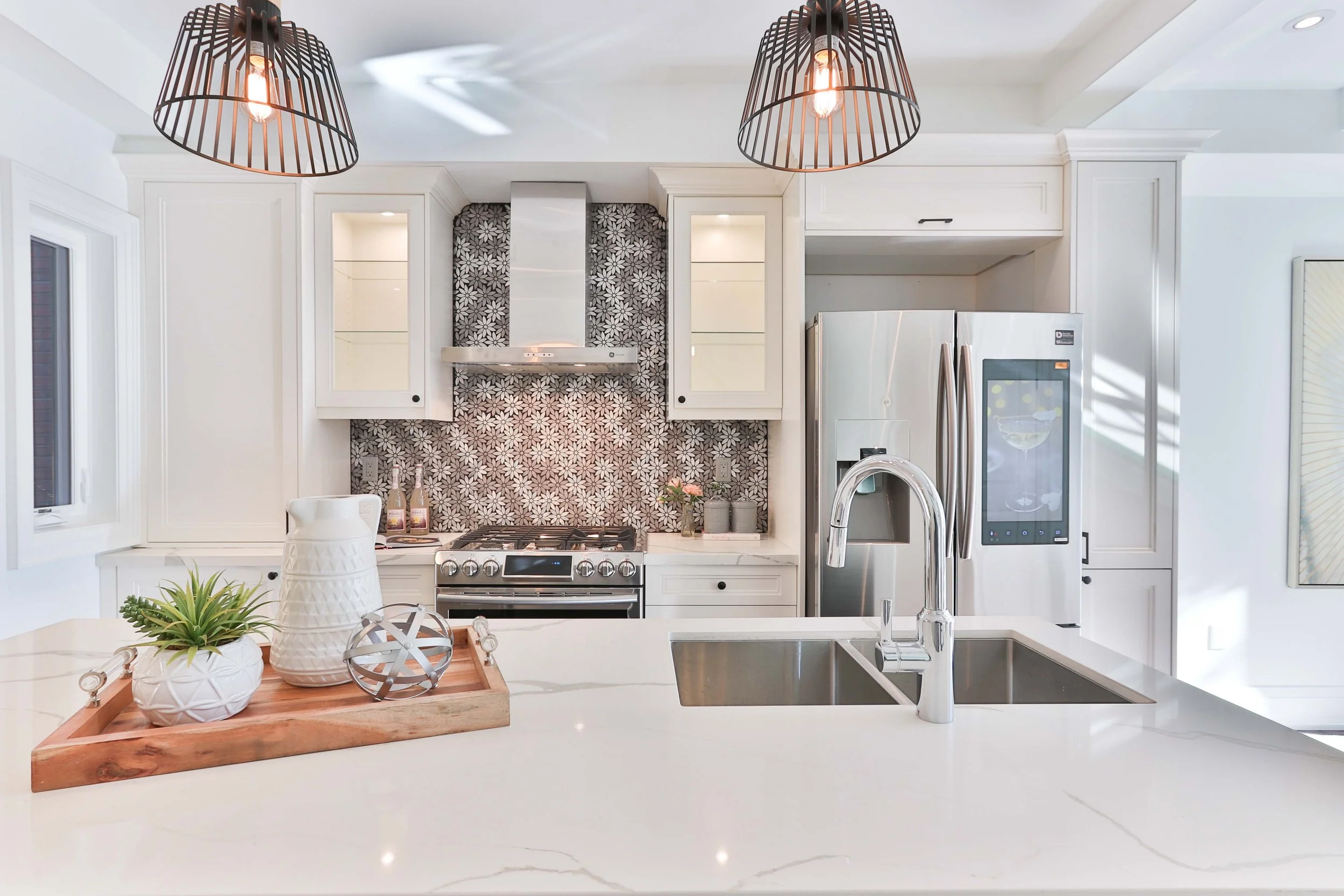Weighing the Pros & Cons of Marble Countertops
There is no doubt that marble countertops are beautiful. They can add a touch of luxury to any kitchen or bathroom. Not only do they add more value to your home, but they also elevate the look and feel of any room. However, marble countertops aren't suitable for every home, and there are some drawbacks you need to consider before making the investment. Below, Jordan Morrissey Interior Design discusses the same pros and cons we weigh with our clients to help them (and you) make a more informed decision!
Photo by Simona Sergi on Unsplash
A Brief History of Marble
If you've ever been in a high-end kitchen, chances are you've seen marble countertops. But have you ever stopped to wonder where they came from? Marble counters have been around for centuries, and their popularity shows no signs of waning. From their humble beginnings to their current status, marble tops continue to be a luxurious kitchen staple.
Marble countertops first gained popularity in Ancient Rome, where wealthy homeowners used them to show off their status. The soft, veined stone was easy to sculpt into beautiful shapes, and it could be polished to a high shine. Over time, marble became associated with luxury and refinement, which is a view many still have the stone today.
The Pros of Marble Counters
Marble countertops have been a popular choice for kitchens and bathrooms for many years. There are several reasons why marble is so desirable. First, marble is gorgeous. It has a smooth, glossy surface that comes in various colors, from classic white to rich black. Marble counters are also very durable, making them a good investment for your home. Furthermore, marble is a naturally cool stone, which means it can handle the heat. Just keep in mind it's not entirely heat-resistant, and you should always use oven mitts or heat pads underneath cooking sheets and hot pots when placing things on your counters.
The Cons of Marble Counters
While marble is beautiful and luxurious, it does come with a few downsides. For one thing, marble is a soft, porous stone, which means it's more susceptible to scratches and stains than other materials. The way to get around this is to seal the marble regularly. Furthermore, it can be tricky to find the right cleaner for marble that won't damage the surface. In addition, marble is one of the more expensive countertop materials. So while it is true that it's becoming more affordable, this stone may not be the best choice if you're on a tight remodeling or building budget.
Photo by Sidekix Media on Unsplash
How to Care for Marble
If you're still considering marble counters at this point, you'll want to take extra care of them to keep them looking shiny and new. Here are a few tips on how to care for them:
Wipe up spills immediately. Marble is porous, so spilled liquids can quickly cause stains.
Use hot pads or trivets to protect the marble from heat damage.
Avoid using harsh cleaning chemicals. Instead, use a gentle marble cleaner or warm water with mild dish soap.
Polish the marble regularly with a marble polish or WD-40. This will help to prevent dullness and scratching.
These essential maintenance tips will help keep your marble counters looking brand new for years to come!
Who Should Buy Marble Countertops
While adding value to your home is always the end goal of a remodel or new build, some materials simply aren't suited for certain lifestyles. When selecting the right counters for your home, we know you want something that looks stunning, is durable, and will last. Marble is one of those, but it still may not be right for your family. Here are a few things to consider before you make the investment:
Do you have kids?
Marble is a delicate material that can easily be scratched or stained. If you have young children, marble countertops may not be the best choice for your home.
Do you entertain often?
Marble countertops require some special care. If you entertain frequently, you'll need to take extra precautions to prevent spills and stains.
Can you afford it?
Marble countertops can be pricey. Make sure you factor in the cost of installation and upkeep before deciding.
If you're considering marble countertops for your home, weigh the pros and cons carefully. It's a big investment, but if you're willing to put in the work, marble countertops can add real value to your home.
Quartzite: A Great Alternative to Marble
If you still love the look of marble but aren’t ready for the investment, quartzite countertops are a great alternative. Not to be confused with quartz counters, quartzite is still a natural stone that resembles marble with soft veining and cool color tones. Quartzite is also a tougher stone that’s heat-, scratch-, and chemical-resistant, making it ideal for kitchen use.
For more tips, tricks, and answers to your most frequently asked questions, make sure you follow Jordan Morrissey Interior Design. Also, don't forget to sign up for our newsletter to get all the latest right in your inbox!


